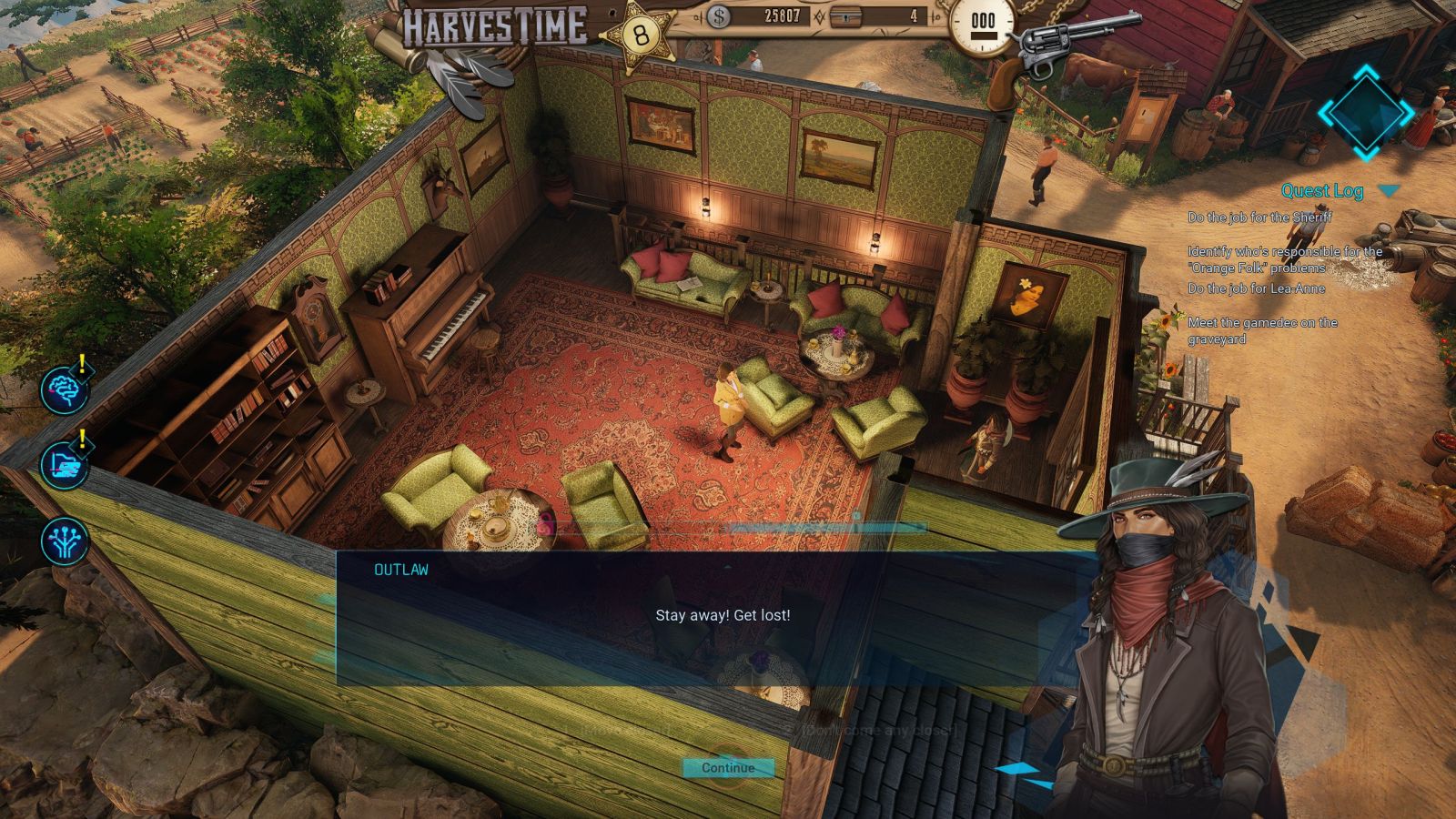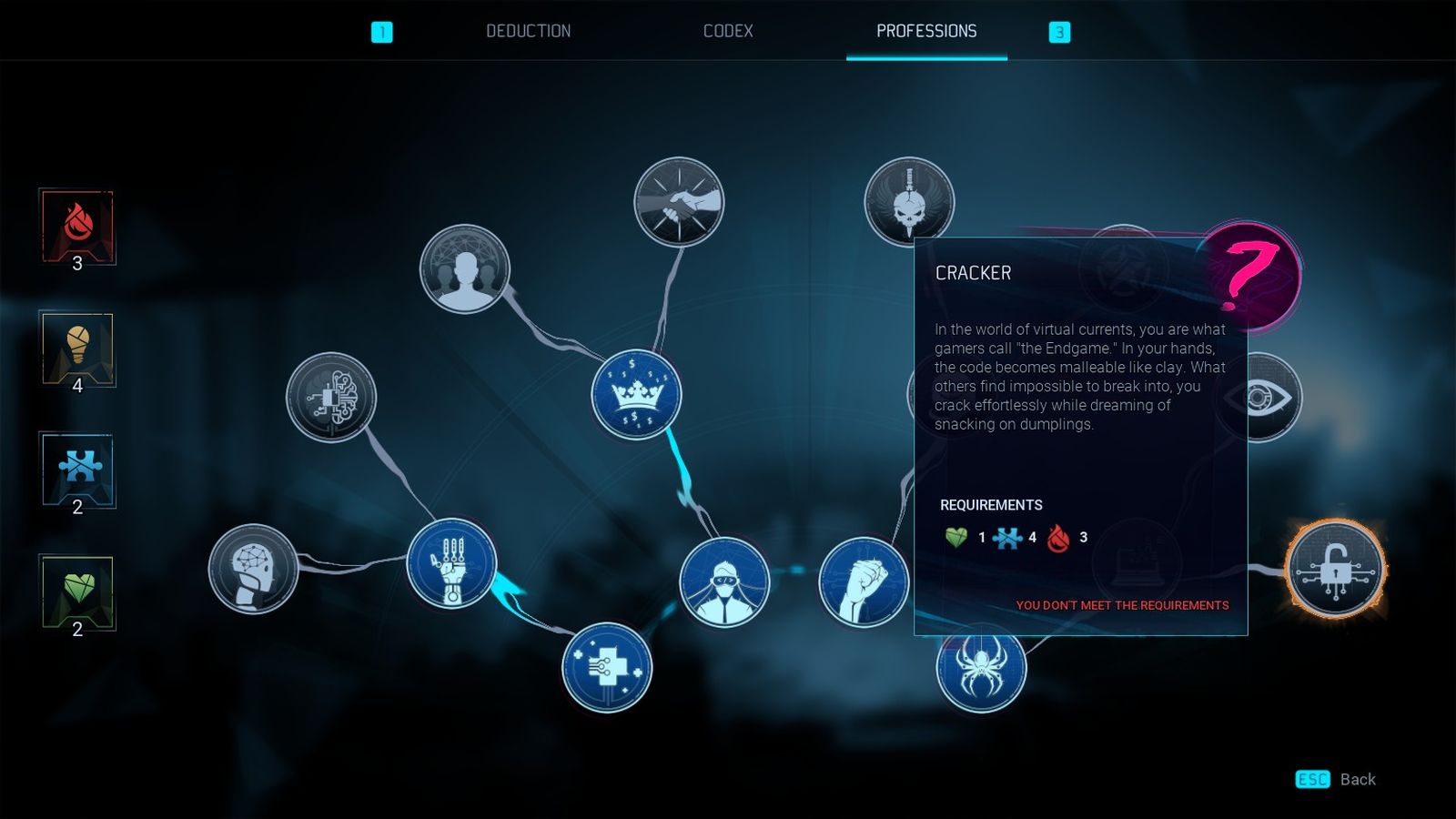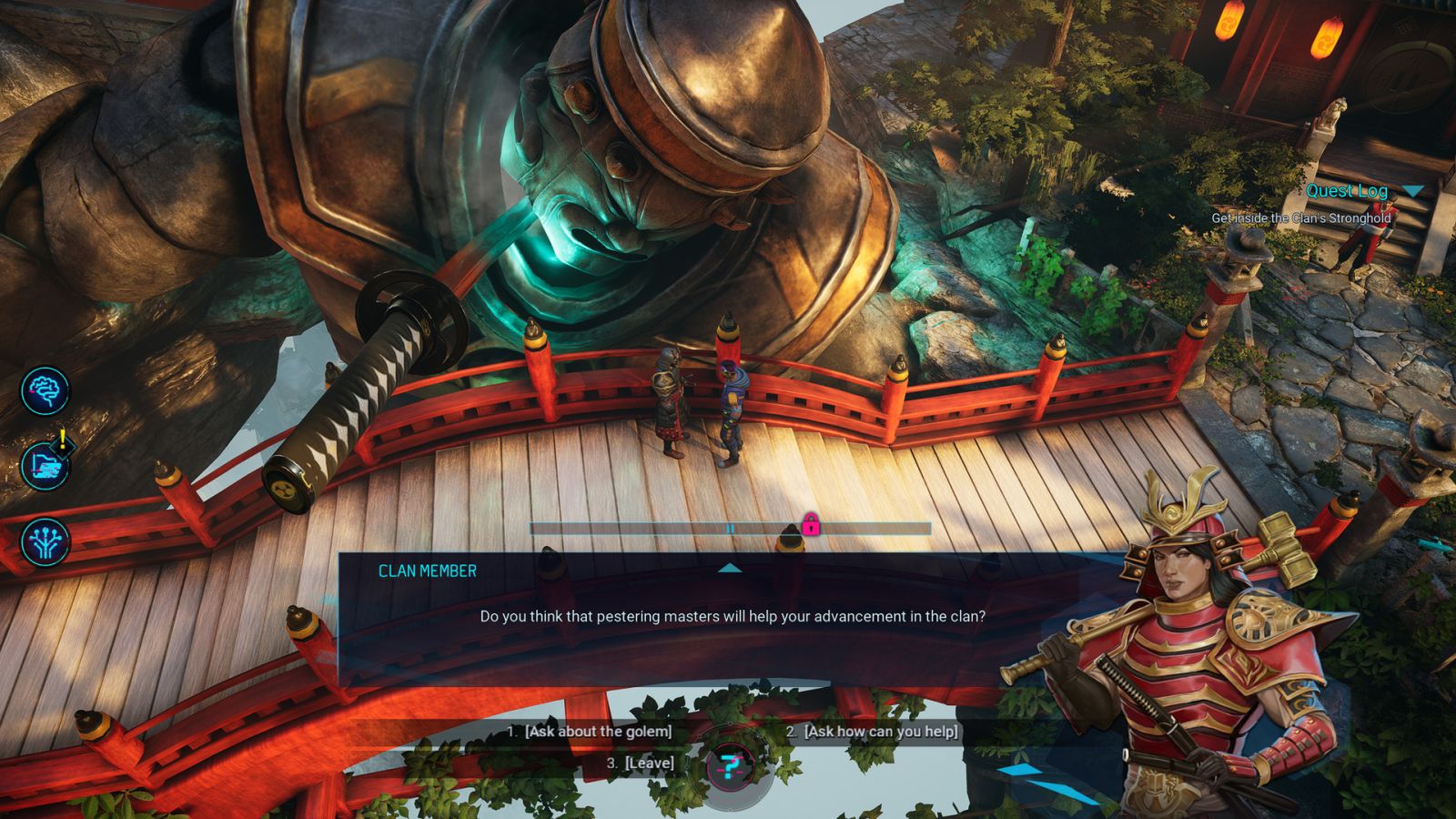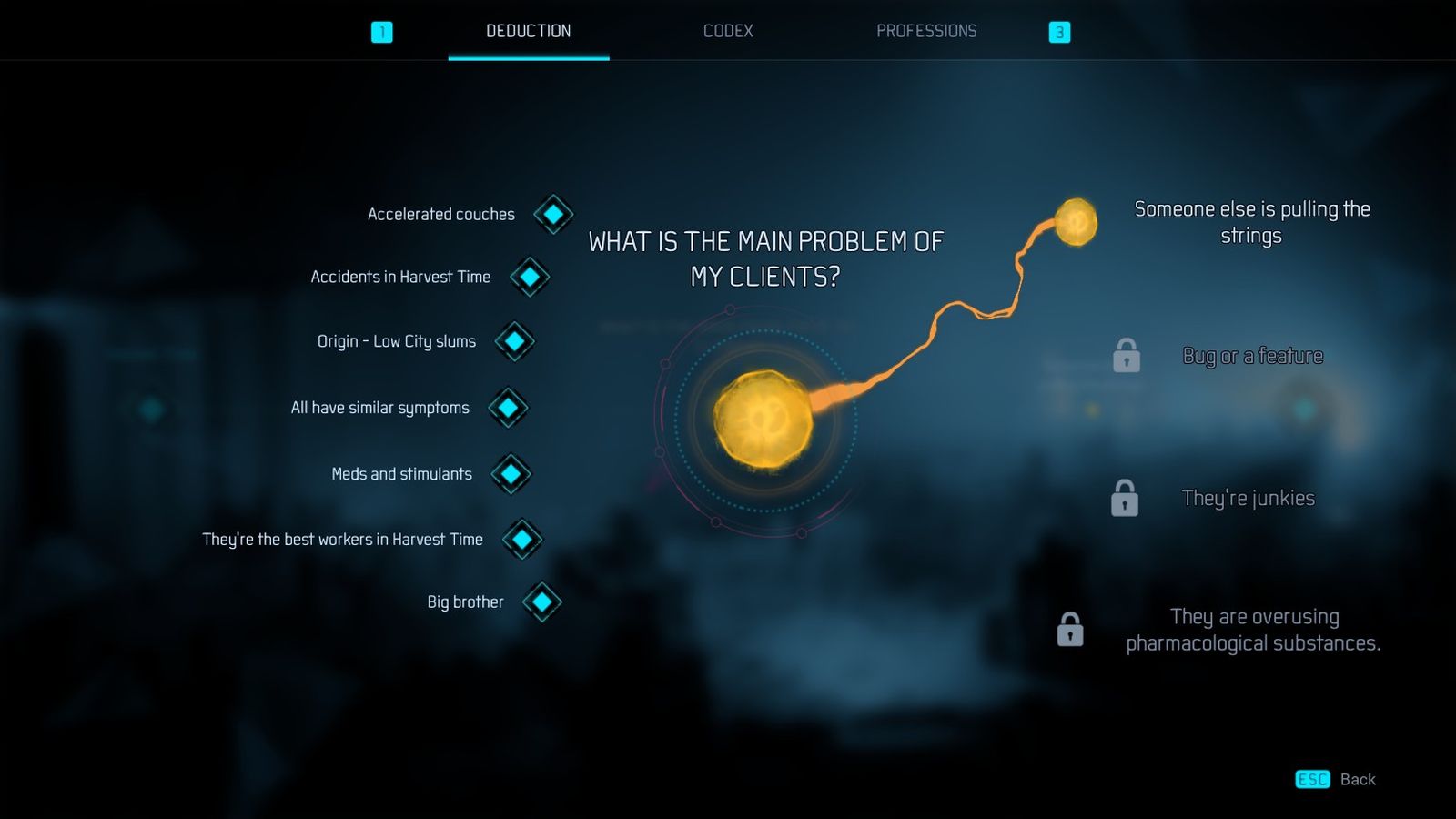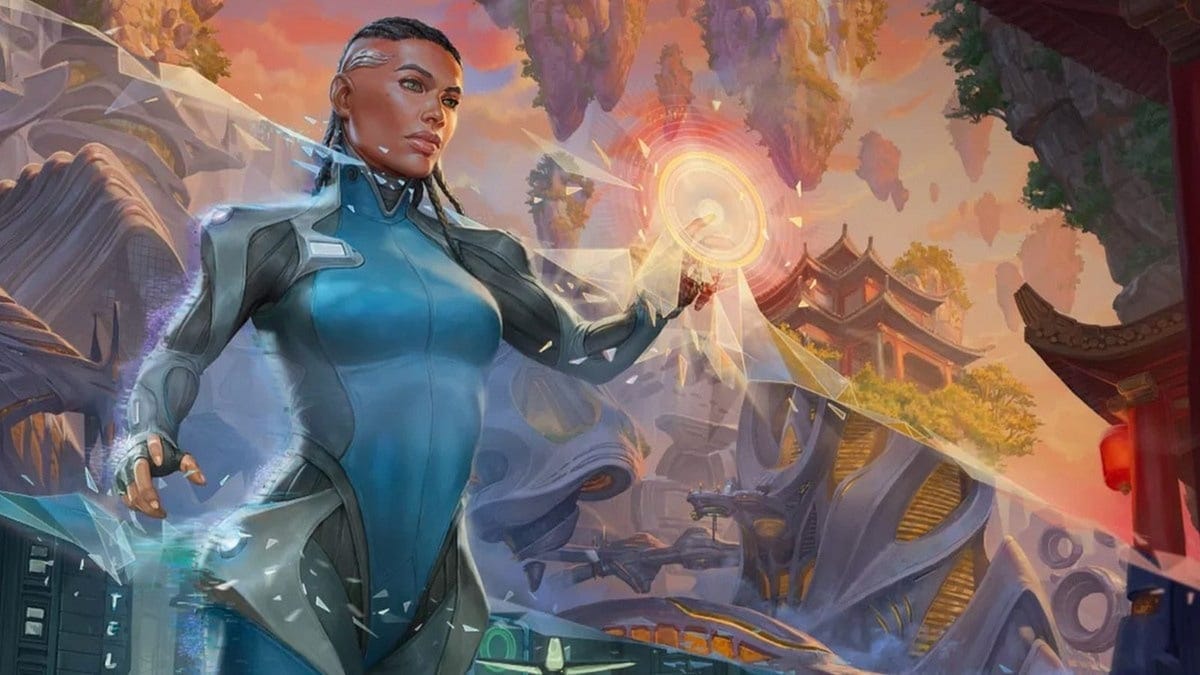
One of William Gibson’s quotes continues to swirl around in my head, and every year it becomes more true. “The future is already here — it’s just not very evenly distributed” describes the world in a very real way, but what happens when we answer those ethical and moral questions that plague us and really embrace technology at all levels? Is replacing a limb with a cybernetic part that operates better than the human version acceptable if you aren’t in some way missing the limb in the first place? What about slotting an AI companion or helper into your skull to give you a tactical edge? When does virtual reality become more real than the real world? Can you fully unplug and just live in cyberspace? When everyone has access to the same virtual worlds, does it even the playing field, or do we find that the distribution of the future becomes even less evenly distributed? Gamedec leaps us into the 22nd century where many of these questions are answered, and not always for the better.
First and foremost you should know what a Gamedec is, and why they are needed. The vast expansion of virtual worlds has given rise to many new professions, and one of those is a Gamedec — an in-game detective. As a Gamedec, your job is to investigate cybercrime that happens inside game worlds, especially when they have effects that impact the real world. That isn’t to say it’s all murder and high crime — sometimes it’s petty virtual theft or something more mundane. The story of Gamedec starts when our protagonist gets a contract to come to figure out how some rich kid managed to get himself stuck in a virtual world. What happens next is entirely up to you.
When you step into Warsaw City, you’ll see that the world of the future is still very much divided into the haves and have nots. Divided into four levels, the city is built on the bones of old Warsaw. Low City is the lowest in the stack, all but completely immersed in perpetual darkness cast by the city portion above it. This is, for lack of a better descriptor, the slums, filled with the destitute and the desperate. Above this lies, as you might guess, Mid City. The rank and file live here, including you, working and toiling to try to get ahead. Jutting into the sky above lies High City — and nobody sits above them. The ruling class lives here in luxury beyond anything their lessers could ever imagine. Nobody wants to talk about the last part of Warsaw City, but it’s there. Turn your eyes away if you must, but this is where people who have rejected the life above live like beasts. Toxic and ruined, this isn’t an area where you want to step without being well armed and full of purpose.
Even when you travel to meet a client, you really haven’t arrived at your final destination. Your cases often start when you park your butt on a couch and don your helmet. With the aid of a handful of drugs to slow your digestive system, and a nutrient paste to keep you hydrated and fed for literal days at a time, you are ready to enter the Gamedecverse. For many living in Warsaw City, this is the real world, or “Realium” as they call it.
In the 22nd century we are all past the questions that drag our morality — yes, we can implant AI and not have it destroy us; we can live our lives in a virtual world. Yes, we can replace parts with cybernetics; things like death have little meaning when you can go on living in cyberspace. Similarly, freeing yourself from constructs like age, gender, body type, and even your central motivation is incredibly freeing — in the Gamedecverse you can be anyone or anything you want. Amazingly, the writing in the game is good about supporting this freedom premise fairly well — things are rarely as they seem.
There is an absolute metric ton of information hidden in every corner of Gamedec. Every space is sprinkled with interactive elements, as well as flavor text that deepen the lore of the world the Anshar team has built. This should come as no surprise, given that Gamedec is based on a book by author Marcin Przybyłek by the same name. There are few voice-acted lines in the game, meaning the bulk of your time is spent reading. Thankfully, the writing is so good that you won’t mind one bit. It’s a mixture of meta, roleplaying, and everything in between. It suits the theme of the game very well as you never really know who you are talking to. Is it a person, an AI, an in-game script, an ally, a friend, a foe, or something else entirely?
There is one thing you are going to do in Gamedec that you won’t expect; you are going to learn a lot of new words. I’ve got a fairly solid vocabulary but some words took me a second to suss out the Latin roots to figure out. Proprioception, erotophonophilia, and others will stretch your vocabulary, lest you learn what they mean the hard way. In the case of a few of these, you could leave somebody a vegetable, permanently locked in a cyber-hell caught between the Realium and the virtual world.
As you make decisions in the game, they might appear to be mundane and rote, and in other games they just might be. Here, even the most mundane of choices can suddenly and unpredictably pop up. When they do, they are often prefaced with a colored text that says “Past choices” — not that you could do anything about it now. Your choices are permanent.
You’ll visit over half a dozen game worlds in addition to the Realium. I don’t want to ruin any settings but let’s talk about Harvest Time as an example. You end up getting hired by a group of players to investigate some strange disconnection issues in the game. Harvest Time is an free-to-play experience not unlike a high-res version of Farmville. Well, like any good F2P game it’s designed to suck the life and money out of you. Up to level 10 is free, but to hit level 16 will require a premium account. How you get there, once again, is about choice. You can head out to your pumpkin patch, “tap” on pumpkins, and earn coins, of course. If it sounds tedious, that’s on purpose — this is a “Free to play” game world, and the game world reflects that. You can even purchase completely meaningless-but-pretty cosmetics for your farm, but they just soak more coins from your account. But you are a Gamedec, so your skills can make a world of difference. For instance, in the scenario below I needed to get into a “Freemium” farm to talk to the people working it. I could generate a keycode to open the gates properly, I could reprogram the gate because I had taken the programmer skill, or I could simply bash it with a digital crowbar, if I had the Cheater perk. All of these would have repercussions, and every choice is tracked — you never know who is watching.
One of the best parts of Gamedec is the deduction system. As you talk to people you’ll gather clues. Whether you have enough information to actually draw a conclusion or not, you can make assumptions and draw a conclusion to a central question. As an example, “What is the main problem of my clients?” is a question. I have four choices you can see below, and none of them are great. On the left is information I’ve gathered, and on the right are the conclusions I can tie that information to, whether it’s the truth or not. Even if I’m wrong, the game will play those choices out to their conclusion, for better or worse. Having chosen one possible conclusion, I’m now presented with three more choices, and so it goes until you resolve each case.
Gathering data is a big part of Gamedec, and one of the largest fonts of information is the conversation minigame. Presented as a bar with locks on it, conversation trees unlock as you deduce a person’s motivations. Carefully navigating based on what you know about the person in front of you may allow you to further dig into their past, garner additional cooperation, or even cause them to outright kill you in creative ways. More often, once you have enough information from these conversations, you can go back into the deduction tree and tie additional choices together. You don’t often get a second chance at these, so choose wisely.
As you make decisions both big and small you’ll get points you can spend to unlock professions. These professions are more like character traits. For example, one skill lets you hack mundane objects and expose the infrastructure underneath to exploit it. Others give you insight into the health of the people you are talking to, giving you the opportunity to observe medical maladies and occasionally even offer help. Programming lets you delve deep into the code of objects, often uncovering hidden administrative options. If you dig deep into the stories you’ll probably eventually unlock most if not all of the professions, but having the right skill at the right time may not always be possible. Again… choices.
The games (called “Virtualium” here) that you’ll enter all have their own mechanics. Some might give you a gun, kill counter, and death counter, but others still might focus more on coins, loot boxes (don’t worry — no real microtransactions in the game), and levels. As another example, one scenario puts you in an MMO and your job is to infiltrate a clan. You’ll have to go gather things, pick up and deliver other things, and then deliver yet more things to the quest giver for coins to earn the clan’s trust (I’m being purposely vague again). When you can bend the rules of the system, however, there are other options. You can use your professions to instead take over the skin to become a cat to sneak into the fortress, you can use your skills to eavesdrop, or you can even use your cyberskills to hack the system to get the currency in an illicit manner. Grinding out the coins can be a lot of running around, but you can even gather up all the resources in the area and even forge the coins yourself. Failing all that, you can resort to blackmail, hacking, extortion, or outright cheating. There are no true fail states — everything will move you forward, just perhaps not in the direction you wanted to go.
Each case in Gamedec is separate. Most of the cases take place inside of a game, but this is a detective story, so unsurprisingly they are eventually all interconnected. How they connect is yours to discover. There are a total of eight cases in the game, but not every choice will lead you to every interaction. The first playthrough will take you between 10-15 hours, depending on how much you stop to smell the roses. Given that choosing a different profession can provide wildly different choices, as well as very different options to solve the choices before them, this is a game that you’ll want to replay. On my first run I made brash and uncharacteristically rude choices, earning a ton of the fire aspect…thing (no tooltip title means I can’t tell you what this is called), but my second time I made more logical choices, skewing far more towards persuasion skills rather than brute force code manipulation. What I found in that second run was exciting.
By making different choices, I uncovered different dialogue options, as you’d expect. While the central theme didn’t change much, and some of the outcomes were very much the same, other times I met entirely new characters and discovered brand new threads that I didn’t even know existed. It may still be the illusion of choice, but the illusion is more the excellent David Copperfield level of magic, not the pointless Chris Angel type.
Unfortunately, I’ve run into a number of issues trying to review Gamedec. When I met an important character called “The Outlaw” I suddenly couldn’t select the menu items to continue the conversation, nor could I exit — an issue that persisted with the final code. I had to force close the game, and it took several attempts to get past this. Similarly, when I tried to “unmask the villain” at the end (I’m being vague so as to not spoil anything) I got stuck and couldn’t click continue on the section, again forcing a CTRL-F4 to quit. I’ve had my character go invisible more than once. There are a number of pronoun reversals, misspellings, missing tooltips, and weird link text that exposes the code behind the scenes. During one sequence I was asked to interact with a specific character to close out a quest line, but that character would not talk to me about that topic (I’m being purposely vague to not spoil it), meaning I had to just leave that game world having not resolved the thread. Even now I’ve sent the developers another lock situation, having to pick an option I didn’t want simply to progress. In terms of stability, I’ve also had a few crashes to desktop, and one outright system lock. You’ll also run into characters with generic silhouettes, which tells me that the team ran short on time — a shame as the character art is a thing of beauty. Thankfully most of the issues I saw are cosmetic, but some of these are quite severe. The Anshar team promises that hotfixes are coming, but you can expect some wonky things at launch.
Gamedec is hard to classify, but tabletop games like Fallout 2, Baldur’s Gate, and other RPGs with deep narrative choice are the closest analog. What makes this different, however, is that there is no combat focus, instead leaning heavily into detective work and meaningful decisions. Thankfully, this part of the game is excellent, keeping me guessing just what was around the next corner.
To be clear, I’m very much in love with Gamedec and all of its concepts, but right now it feels like an abusive relationship. I’ve had to verify my game files, restart autosave, force close, and force reboot my machine more than a few times, and that’s on final code. I want to play this game, but it clearly doesn’t love me back in the same way. It’s infuriating as underneath these problems lies one of the most unique and ambitious games I’ve played in a very long time. If they can fix these underlying problems I’ll gladly shout my praises from the rooftops, but as it stands Gamedec needs some help.
Gamedec
All Right
Underneath stability problems and bugs lies one of the most ambitious games I’ve played, bringing a tabletop game level of choice to RPG enthusiasts. The rich story and excellent writing delivers in a huge way...if you can get the game to cooperate.
Pros
- Excellent writing across the board
- Choices feel impactful
- Gorgeous art style
- Enjoyable parody of various game styles
- Game goes unusual and unexpected places
Cons
- Dialog lock bugs
- Hard and soft system locks
- Frequent cosmetic problems
- Occasional broken quest lines

